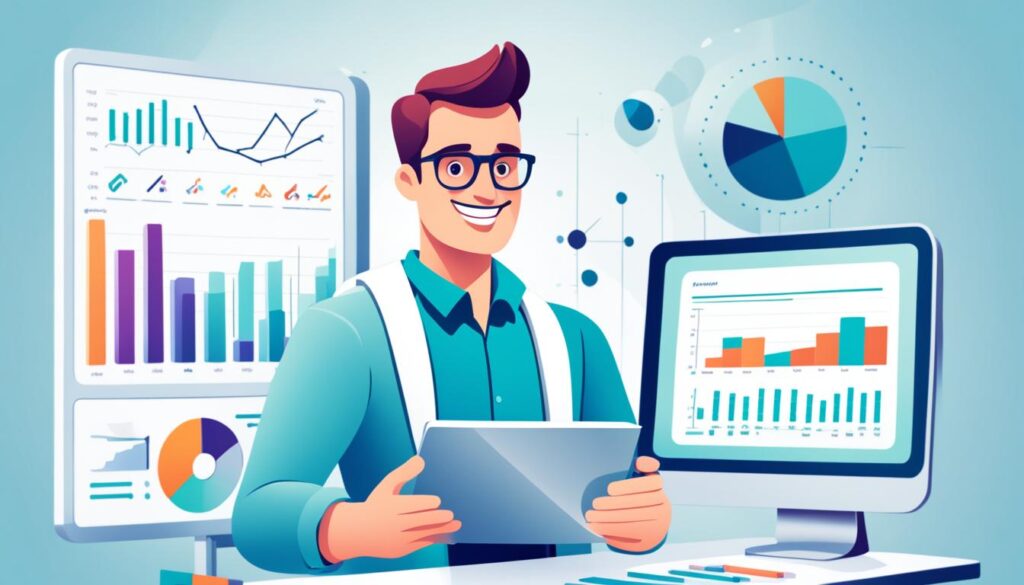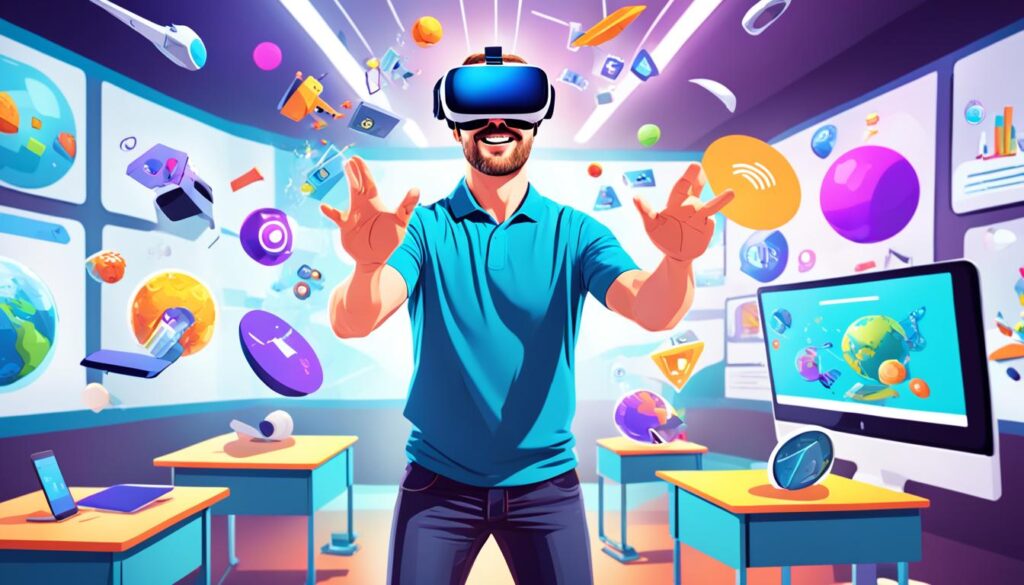Are you a middle-aged adult trying to keep up with the fast-changing world of artificial intelligence (AI)? Only 30% of Americans know a lot about AI in their daily lives. Yet, AI’s impact is huge. It’s changing how we live and work, especially for middle-aged people.
AI is now part of our daily routines, from health monitoring to managing our finances. It also brings up new worries like job security and privacy. This article will look into how AI is changing life for middle-aged Americans. We’ll also share tips on how to deal with the AI-powered future.
Are you up to date with the latest AI news, or do you feel like you’re falling behind? Let’s dive into the AI trends affecting middle-aged adults. Learn how to use these new technologies to your advantage while tackling the challenges they bring.
AI in the Workplace
AI is changing the job world fast. Middle-aged workers need to keep up. The OECD predicted in 2019 that AI could take away 14% of jobs and change another 32% in 15 to 20 years. This means over 1 billion people could be affected worldwide.
AI-Powered Automation and Productivity Tools
Generative AI, like ChatGPT, is making AI’s effect on jobs even bigger. These tools can make workers more efficient but also worry about job loss. A recent survey found 75% of Americans think AI will cut the number of jobs in the U.S. in the next 10 years.
Upskilling in the AI Era
To keep up with AI, middle-aged workers need to learn new skills. Harvard’s Digital Reskilling Lab and the Boston Consulting Group’s Henderson Institute found five key points for reskilling: (1) It’s a must for everyone, (2) Leaders and managers should lead, (3) It’s a big change effort, (4) Workers are ready to learn if it helps, and (5) It needs a team effort.
As ai-powered automation and productivity tools keep changing, middle-aged workers must act. They need to upskill in the ai era to stay ahead and tackle job automation concerns at work.
Healthcare Advancements
Artificial intelligence (AI) is changing how middle-aged adults handle their health. It’s making them more active in their care. AI helps with everything from personalized medicine to mental health support.
AI in Personalized Medicine and Prevention
AI-powered wearables let middle-aged adults keep an eye on their health. They can track things like heart rate, activity, and other health info in real-time. Then, AI looks at this data to spot early signs of health issues and suggest ways to prevent or manage them.
Also, AI in personalized medicine and prevention leads to better diagnoses and treatment plans. It considers things like your genes, lifestyle, and environment. This means doctors can give you treatments that really fit you.
AI-Assisted Mental Health Support
AI-assisted mental health support is great for middle-aged adults too. AI chatbots and virtual therapists offer help that’s easy to get and tailored to your needs. They provide support all the time, give you strategies to cope, and can spot mental health problems early.
As AI becomes more common in healthcare, middle-aged adults will get better, more tailored care. They can use AI to manage their health in new ways. This means they can take charge of their health and well-being like never before.
Financial Management
As middle-aged adults face the changing financial world, they’re turning to artificial intelligence (AI) for help. AI is changing how they handle their money. It offers personalized advice from lots of data.
AI looks at your financial past, how much risk you can take, and your goals. It then suggests the best investments and financial plans for you. This makes middle-aged adults more confident in their financial choices. AI also automates tasks like budgeting, giving them more time for important financial planning.
Fraud Detection and Prevention
AI is also key in fighting financial fraud. It checks transactions for anything odd and warns about suspicious activities right away. This adds an extra safety layer for middle-aged adults’ money and info.
AI helps protect against identity theft and other financial crimes. It makes middle-aged adults feel safer with their money. By using AI, they can improve their ai-driven investment and financial planning. They also get better at fraud detection and prevention. This helps them handle today’s complex financial world better.

Smart Home and Mobility
AI is changing the lives of middle-aged adults in big ways. It brings smart home and mobility tech into their daily lives. AI helps with home security and makes getting around easier, giving them more freedom.
AI-Powered Home Assistants and Security
AI helpers like Amazon Alexa and Google Assistant are getting popular with middle-aged folks. They manage smart devices, set reminders, and give advice based on what you like. Also, AI security systems watch out for dangers, making homes safer and more secure.
Autonomous Vehicles and Smart Transportation
Autonomous cars and smart transport are changing how middle-aged adults move around. Self-driving cars and ADAS give them more freedom, especially if they can’t drive anymore. These AI tools also cut down on traffic, making it easier for them to get around.
Education and Lifelong Learning
As middle-aged adults look for new job skills, AI-powered online courses and personalized learning platforms offer great chances for lifelong learning. These tools use artificial intelligence to make learning fit each person’s needs. They track progress, find gaps in knowledge, and change the course to help learners better.
Virtual and augmented reality technologies are making learning more fun and interactive for middle-aged adults. These technologies put learners in simulated worlds. Here, they can practice what they’ve learned in real situations, getting skills for their jobs or hobbies.
The growth of online education opportunities has changed the game for middle-aged adults. It offers flexible learning that fits their busy lives and different ways of learning. With AI-powered online courses and personalized learning, they can go after new degrees, learn new skills, or follow their interests.

As jobs change and the need for ongoing learning increases, middle-aged adults are using new tech in education. With AI and immersive tech, they can grow personally and professionally. This puts them ahead in a changing job world.
Social Connectivity and Entertainment
AI is changing how middle-aged adults use social platforms and enjoy entertainment. Now, AI makes social interactions more personal and fun. It also offers entertainment that fits what people like.
AI-Enhanced Social Platforms and Communication
AI is making social media and messaging apps better for middle-aged adults. These ai-enhanced social platforms and communication tools use AI to understand what users like. This means users get content and recommendations that are just right for them.
Now, middle-aged adults can connect with others in a way that feels more real. They can build stronger relationships and feel like they belong.
AI-Curated Content and Virtual Experiences
AI-curated content and virtual experiences are making entertainment exciting for middle-aged adults. AI looks at what people like and suggests movies, TV shows, music, and more. AI assistants also make virtual experiences better, like immersive games and personalized events.
Thanks to AI, middle-aged adults can stay connected, entertained, and fulfilled in a digital world. This helps them feel part of a community and satisfied with their lives.
Ethical Considerations
AI is becoming a big part of life for middle-aged adults. But, concerns about data privacy and AI bias are growing. The Pew Research Center found that 53% of Americans think AI is more of a threat than a help when it comes to keeping personal info private. Also, worries about AI’s effect on jobs, like losing jobs, are big for this group.
Data Privacy and AI Bias Concerns
Using AI more means more worries about keeping personal info safe and AI making biased decisions. Many middle-aged folks are fretting over the safety of their personal info and how AI might use it. They’re also aware of AI bias risks, where algorithms can make unfair and discriminatory choices.
The Impact of AI on Employment
AI in the workplace worries middle-aged adults too. With AI tools getting better at automating tasks, some jobs might just disappear, causing career disruptions. Figuring out how to handle these ethical issues will be key as AI changes work and personal lives.
Dealing with these ethical issues will need teamwork from lawmakers, tech firms, and everyone else. Creating strong data privacy laws, using AI responsibly, and helping workers get new skills are key steps to make sure AI’s benefits and risks are shared fairly. Keeping the public’s trust and feeling safe is vital for AI to be widely accepted and used by middle-aged adults.
Future Outlook
AI technologies are changing our lives fast. Middle-aged adults need to get ready for a world more connected to AI. They must learn new skills and understand how to use AI tools right. This way, they can use AI’s benefits and still value human smarts.
Preparing for an AI-Integrated Society
For success in an AI world, middle-aged adults should keep up with AI news. They need to see how AI can make work easier, help with decisions, and automate simple tasks. By learning new things and embracing lifelong learning, they can keep up with the job market and enjoy AI’s perks.
Balancing Human Skills with AI Capabilities
AI is getting better all the time, but middle-aged adults should focus on their unique skills. Skills like thinking deeply, being creative, understanding emotions, and making ethical choices are key. By using AI’s strengths and their own skills, they can be valuable in a tech-heavy world.
